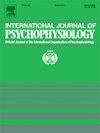Cardiovascular responses to mental fatigue in a sequential task paradigm
IF 2.6
3区 心理学
Q3 NEUROSCIENCES
引用次数: 0
Abstract
This study investigated mental fatigue within a sequential task paradigm using cardiovascular measures and predictions derived from Motivational Intensity Theory. Forty-two undergraduate students were assigned to either a fatigue group (n = 21) or a control group (n = 21). The fatigue group completed a difficult task, while the control group watched a documentary, before both groups performed the same difficult subsequent task. Subjective fatigue, performance, and cardiovascular responses were assessed. Participants in the fatigue group reported significantly higher levels of subjective fatigue and lower effort intensity during the subsequent task compared to the control group, as evidenced by reduced PEP and HR reactivity. Despite these differences, performance on the subsequent task did not differ between groups. These findings suggest that a prior difficult task can increase the perceived difficulty of subsequent tasks. When the subsequent task is also difficult, the effort required may be viewed as no longer worthwhile, leading to reduced effort investment. Cardiovascular measures and theory-driven approaches, such as Motivational Intensity Theory, provide valuable insights for understanding mental fatigue and should be employed rather than relying exclusively on performance-based data.
在顺序任务范式中心血管对精神疲劳的反应。
本研究利用心血管测量和动机强度理论的预测,在顺序任务范式下调查了精神疲劳。42名本科生被分配到疲劳组(n = 21)或对照组(n = 21)。疲劳组完成了一项困难的任务,而对照组则观看了一部纪录片,然后两组都执行了同样困难的后续任务。评估主观疲劳、表现和心血管反应。与对照组相比,疲劳组的参与者在随后的任务中表现出明显更高的主观疲劳水平和更低的努力强度,这可以从PEP和HR反应性的降低中得到证明。尽管存在这些差异,但两组之间在后续任务中的表现并没有差异。这些发现表明,先前的困难任务可以增加后续任务的感知难度。当后续任务也很困难时,所需的努力可能被视为不再值得,从而导致减少努力投资。心血管测量和理论驱动的方法,如动机强度理论,为理解精神疲劳提供了有价值的见解,应该被采用,而不是完全依赖于基于表现的数据。
本文章由计算机程序翻译,如有差异,请以英文原文为准。
求助全文
约1分钟内获得全文
求助全文
来源期刊
CiteScore
5.40
自引率
10.00%
发文量
177
审稿时长
3-8 weeks
期刊介绍:
The International Journal of Psychophysiology is the official journal of the International Organization of Psychophysiology, and provides a respected forum for the publication of high quality original contributions on all aspects of psychophysiology. The journal is interdisciplinary and aims to integrate the neurosciences and behavioral sciences. Empirical, theoretical, and review articles are encouraged in the following areas:
• Cerebral psychophysiology: including functional brain mapping and neuroimaging with Event-Related Potentials (ERPs), Positron Emission Tomography (PET), Functional Magnetic Resonance Imaging (fMRI) and Electroencephalographic studies.
• Autonomic functions: including bilateral electrodermal activity, pupillometry and blood volume changes.
• Cardiovascular Psychophysiology:including studies of blood pressure, cardiac functioning and respiration.
• Somatic psychophysiology: including muscle activity, eye movements and eye blinks.

 求助内容:
求助内容: 应助结果提醒方式:
应助结果提醒方式:


